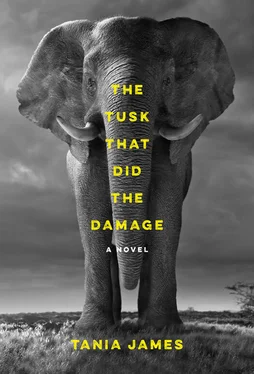Our silence lasted until I pulled up to the house. As the engine died, we stared at the scene, same as we had left it, and suddenly it seemed that the whole horrible night had been a dream.
“She thinks the baby is dying inside her,” Jayan said.
“She is emotional. Any mother would be.”
“Who would know better than her — you? The doctor?” He hung his head, his voice no more than a rasp. “A mother knows these things.”
Refusing my comfort or counsel, Jayan scrubbed the wet from his eyes with the heels of his hands and squinted hard at our broken palm. The set of his jaw declared his intentions as did the muscle twitching under his eye. He would inflict an equal pain. He would bleed the creature white.
I asked him if he had an extra green half pant.
He looked at me. “Are you sure?”
My heart was speeding. I was sure of nothing. Yet I could not let him walk alone.
For a wage of five thousand rupees Jayan enlisted Alias, a fellow who knew the forest as if he had designed it himself. As a bonus he came with his own homemade gun. He was famous for his rosewood muzzle-loaders, five feet long, a height nearly reaching his own. He was equally famous for having only eight fingers. It was said that he had lost his last two digits while scrambling up the side of a mountain. Having wedged his hand between two rocks, he pulled and pulled, then pulled out his knife.
Was he Tamil? Tribal? Superhuman? In regard to Alias, my brother advised me to know less.
Synthetic Achan furnished his own gun for Jayan, a piece he said was specially crafted in Germany. He introduced me to the German in the privacy of his rice shed, carrying on about her origins, unaware that the rifle and I had already met. I thought of Raghu aiming the barrel at my enemies— Take a bet, pussy man. With sad affection, I traced one of the rabbits that leaped between the iron leaves.
“Are you listening, boy? Hold out your hand.” My uncle dropped a pouch of heavy bullets into my palm. “Use what you need but don’t waste. In the sixties, a bullet cost five rupees; now it’s seventy. What do you think a gun like this cost?” I nearly spat when he told me: thirty-five thousand. “And that was back then. ”
All throughout this presentation, my uncle kept fiddling with his nose — scratching, twitching, scrunching — so obvious in his anxiety that, in seesaw effect, I was lifted to a state of calm. “One more thing. Tell your brother to bury the bullet deep. Can’t let the greenbacks find it. If they find it, I am finished.”
I reassured him that all would turn out as planned.
But first I had to get the German past Leela. It was no small task to smuggle the piece from my uncle’s Maruti and into our shed. Two days had passed since Leela returned from the hospital, and surely she would have noticed our doings were she not confined to bed rest. There was a pall about her as she waited for the bleeding to start again, for the baby to vanish inside her like a drop of water. Yet her eyes remained sharp and watchful, her wifely sense undiminished.
One evening my mother had me deliver to Leela a bowl of broken-rice soup. As was my habit, I stole a salty spoonful before giving her the bowl. When I turned to go, she caught me at the threshold: “Get me another spoon. You are sick.”
In fact, my tonsils had been feeling knobby that morning. “How did you know?”
She raised the bowl and blew across the broken rice. “I know when you are hiding something.”
“Hiding?”
“Why else would you be off so quickly?”
“To find you a spoon.”
“Don’t get smart. Look at me, Manu.”
I felt I was standing before a magistrate judge, so stern was her voice.
“What is it?” she said.
“What is what?”
“This thing you are hiding. Is it to do with him?”
“Do I have to say? Mother will hang me.”
“What makes you think I won’t?”
After some song and dance I conjured up a girl I was planning to meet near the snack stall a half mile from home. Leela viewed me through suspicious eyes. “Do you want to marry her?”
“Maybe.”
“Would her parents be happy with you?”
“How should I know?”
“Cut the innocent act. She deserves the truth. Even if she’s too stupid to ask for it.”
Leela looked down at her bowl and stirred the soup with my infected spoon. After a while she said, “Everyone thinks I trapped your brother. But how can a mouse trap a rat? At least he knew what I was.”
“A bricklayer’s daughter.” I glanced at the door, uneasy. My mother could have stood within earshot.
“Bricklayer.” Leela snorted. “My father was no bricklayer. He never lifted a thing aside from his fist.”
After our talk, Leela began to suspect my brother of misdoings no matter the time of day. She turned about and about in bed, occasionally shuffling to the doorway on the pretense of seeking fresh air, searching for our return from the fields.
One morning the window presented my mother with a nauseating sight: a Forest Department jeep grumbling up to the front of our house. My mother found she could not move. What had Jayan done? His old sins rushed through her in a breathtaking wave.
“Who is it?” Leela called from the bed.
The car door opened, and out came a fat black shoe, mannish if not for the mud-spattered sari hem that fell over it.
“Who?”
“Hush,” was all my mother managed to say, for it was the high priestess of the greenbacks aka the lardy little Muslim aka Divisional Range Officer Samina Hakim.
Samina Madame was widely deemed an improvement over her predecessor, a weasel who wore Ray-Bans too fine for his salary and rarely left his roost. Often she was seen stepping into a farmer’s house and taking tea on the veranda and listening to the local complaints with her forehead as neatly pleated as her starched olive sari. Why she had arrived at our home was a mystery. My mother decided to parry any and all attacks with an offer of tea, which Samina Madame accepted.
“Sit, sit,” said my mother, gesturing to my father’s chair.
“Thank you,” said Samina Madame, not sitting, “but I came to see how Leela is doing.”
Samina Madame smiled winningly, her face a pleasant pie. For a heavyset woman there seemed not an ounce of extra to her.
My mother showed Samina Madame into Leela’s room and made a hasty introduction. Leela sat up straight. It was a tremendous blow to receive her enemy while prone and clad in a nightgown.
“Let me get the tea and biscuits,” my mother said and fled.
“Do I look like I need more biscuits?” called Samina Madame jovially.
She dragged a plastic chair next to Leela’s bed and sat. Here, Leela felt, was the harpy responsible for the imprisonment of her husband. The one who had snuffed him out through her sneaks and snitches, had handed him to the Karnataka police like a neat kilo of cake.
“I went to the hospital,” Samina Madame said. “They said you were here. How are you?”
“Fine. Alive. Most people who see the Gravedigger cannot say the same.”
“What luck your husband woke up when he did.”
Though it was I who had awoken first, Leela nodded.
“And,” Samina Madame said, “the baby?”
Leela stared straight through Samina Madame, who leaned back, made aware that she had crossed into forbidden waters.
Both women turned quiet. Samina Madame’s gaze casually traveled the walls. Leela ran a hand over her bedsheet, a new cool cotton scattered with sailboats. She knew the rule: Never buy gifts for an unborn baby. But she had seen these sailboats and disobeyed.
“Is your husband home?” Samina Madame asked.
“In the fields.”
“Will he come back for lunch?”
Читать дальше












